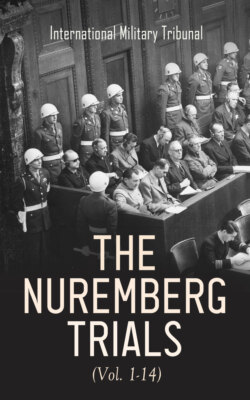Читать книгу The Nuremberg Trials (Vol. 1-14) - International Military Tribunal - Страница 131
На сайте Литреса книга снята с продажи.
The Seizure of Power
ОглавлениеTable of Contents
In the eight years that followed the publication of Mein Kampf, the NSDAP greatly extended its activities throughout Germany, paying particular attention to the training of youth in the ideas of National Socialism. The first Nazi youth organization had come into existence in 1922, but it was in 1925 that the Hitler Jugend was officially recognized by the NSDAP. In 1931 Baldur von Schirach, who had joined the NSDAP in 1925, became Reich Youth Leader of the NSDAP.
The Party exerted every effort to win political support from the German People. Elections were contested both for the Reichstag and the Landtage. The NSDAP leaders did not make any serious attempt to hide the fact that their only purpose in entering German political life was in order to destroy the democratic structure of the Weimar Republic, and to substitute for it a National Socialist totalitarian regime which would enable them to carry out their avowed policies without opposition. In preparation for the day when he would obtain power in Germany, Hitler in January 1929, appointed Heinrich Himmler as Reichsführer SS with the special task of building the SS into a strong but elite group which would be dependable in all circumstances.
On 30 January 1933 Hitler succeeded in being appointed Chancellor of the Reich by President Von Hindenburg. The Defendants Göring, Schacht, and Von Papen were active in enlisting support to bring this about. Von Papen had been appointed Reich Chancellor on 1 June 1932. On 14 June he rescinded the decree of the Brüning Cabinet of 13 April 1932, which had dissolved the Nazi para-military organizations, including the SA and the SS. This was done by agreement between Hitler and Von Papen, although Von Papen denies that it was agreed as early as 28 May, as Dr. Hans Volz asserts in “Dates from the History of the NSDAP”; but that it was the result of an agreement was admitted in evidence by Von Papen.
The Reichstag elections of 31 July 1932 resulted in a great accession of strength to the NSDAP, and Von Papen offered Hitler the post of Vice Chancellor, which he refused, insisting upon the Chancellorship itself. In November 1932 a petition signed by leading industrialists and financiers was presented to President Hindenburg, calling upon him to entrust the Chancellorship to Hitler; and in the collection of signatures, to the petition Schacht took a prominent part.
The election of 6 November, which followed the defeat of the Government, reduced the number of NSDAP members, but Von Papen made further efforts to gain Hitler’s participation, without success. On 12 November Schacht wrote to Hitler:
“I have no doubt that the present development of things can only lead to your becoming Chancellor. It seems as if our attempt to collect a number of signatures from business circles for this purpose was not altogether in vain . . . .”
After Hitler’s refusal of 16 November, Von Papen resigned, and was succeeded by General Von Schleicher; but Von Papen still continued his activities. He met Hitler at the house of the Cologne banker Von Schröder on 4 January 1933, and attended a meeting at the Defendant Von Ribbentrop’s house on 22 January, with the Defendant Göring and others. He also had an interview with President Hindenburg on 9 January, and from 22 January onwards he discussed officially with Hindenburg the formation of a Hitler Cabinet.
Hitler held his first Cabinet meeting on the day of his appointment as Chancellor, at which the Defendants Göring, Frick, Funk, Von Neurath, and Von Papen were present in their official capacities. On 28 February 1933 the Reichstag building in Berlin was set on fire. This fire was used by Hitler and his Cabinet as a pretext for passing on the same day a decree suspending the constitutional guarantees of freedom. The decree was signed by President Hindenburg and countersigned by Hitler and the Defendant Frick, who then occupied the post of Reich Minister of the Interior. On 5 March elections were held, in which the NSDAP obtained 288 seats of the total of 647. The Hitler Cabinet was anxious to pass an “Enabling Act” that would give them full legislative powers, including the power to deviate from the Constitution. They were without the necessary majority in the Reichstag to be able to do this constitutionally. They therefore made use of the decree suspending the guarantees of freedom and took into so-called “protective custody” a large number of Communist deputies and Party officials. Having done this, Hitler introduced the “Enabling Act” into the Reichstag, and after he had made it clear that if it was not passed, further forceful measures would be taken, the act was passed on 24 March 1933.
